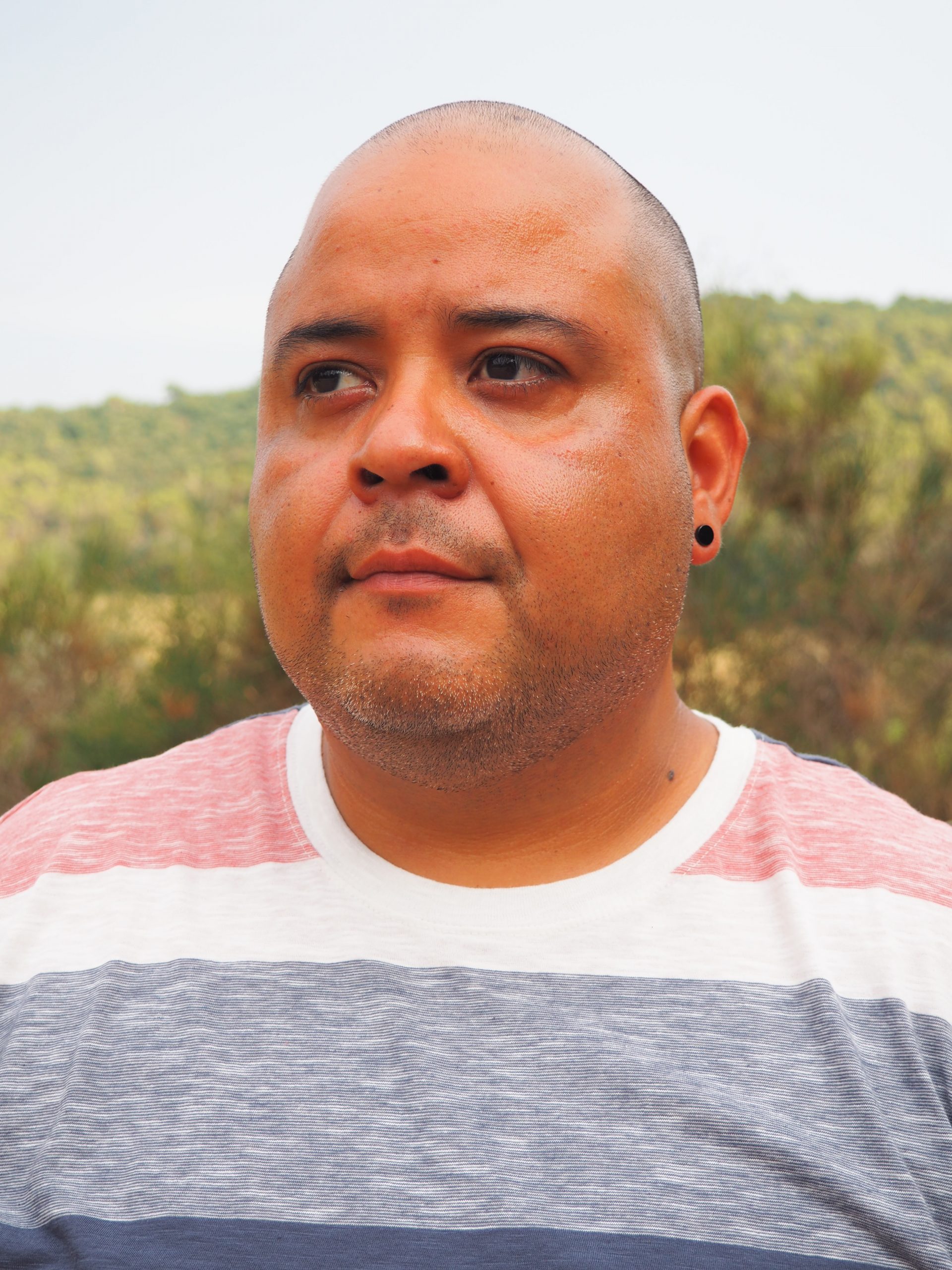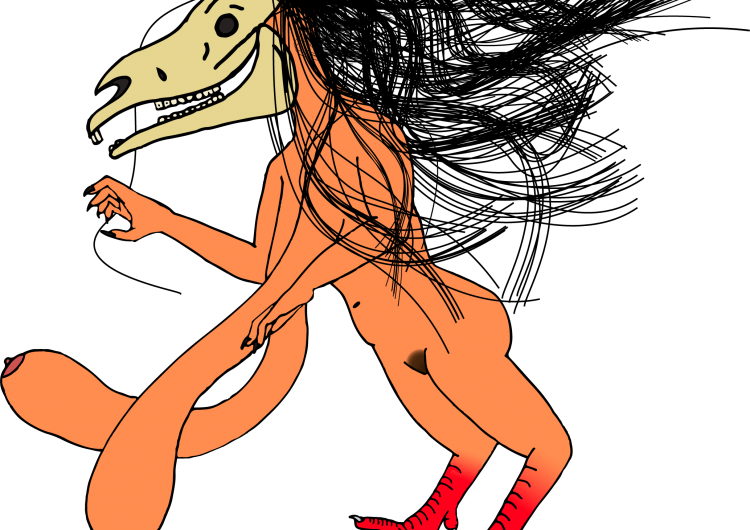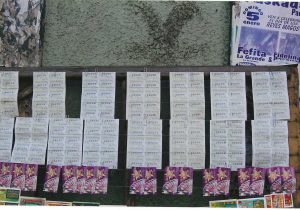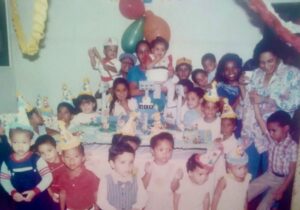in memoriam
Amalia del Carmen
The way the story goes, two whole days passed before Miguel finally stumbled home. And it took just as long for him to snap out of whatever spell had been cast on him before he could speak again and tell everyone what had happened. Gaze transfixed on an empty spot in the distance, one hand clutched as if he were wielding an invisible stone, the other still gripping the handle of his dented machete; a faint smell of dried urine, the new clothes his mother had made him not a week earlier blood streaked and in tatters—this is how Miguel came home, stumbling over the wooden fence that separated the family home from the dark, hungry forest.
Was it an animal? his mother asked, grabbing him by either shoulder.
I should have fetched the water myself, his sister lamented.
His father, wordless, bolted into the forest.
But no matter how much they shook him or how many buckets of cold river water they dumped on his head, Miguel would not speak. He just stood there, mouth a tight slit, his bare feet sinking deeper into the newly-formed mud.
And when he did finally open his mouth, it was to scream.
Miguel—my great uncle—was sixteen when he disappeared. By then he was old enough to join his father and the other men that worked harvesting coffee at the plantation, located on the other side of a thick patch of mango trees that surrounded the family’s two-room house. Monday through Saturday, he would wake next to his father, and after breakfast and their morning prayers they walked the three kilometers through the forest to the plantation, carrying their machetes and water jugs and other provisions to last them the entire day. Normally, they traveled together at dawn to avoid the heat and humidity of the morning. But on the day he disappeared, his sister—my future grandmother, who told us the story of what happened to Miguel—had come down with a fever and could not fetch the family’s water from the river like she always did. So instead Miguel, at his mother’s request, set off for the river himself, a bucket in either hand, machete strapped safely onto his belt.
Things in El Salvador were different in those days, of course. Before the telephone lines were installed and streetlights illuminated the trees with their jaundiced glow, before the family had running water and a permanent stove on which to cook, a boy could be tasked with walking through dense forest that he knew how to navigate better than his town’s packed dirt streets. No one—not his family, or the nearest neighbors, or the priest—could explain Miguel’s disappearance. All they could do was wait.
The night he came home, his mother and sister brought him into the house and slowly undressed him, tossing his torn clothing into a corner. His mother winced when she saw the scratches on his arms, legs, and back. She ran her fingers across the cuts and thought that they resembled those that a bird’s claws would make. His sister looked away from her brother’s nakedness and the puff of dark hair, instead keeping her gaze fixed on the broom that she used to sweep the floors. Miguel’s father, meanwhile, sat at the entrance to the home, machete in hand, watching.
They stood Miguel in the large bucket the family bathed in and gently washed him with the river water that they’d warmed over the open flame. The water turned rusty with the dried blood they removed from the long, deep cuts that crisscrossed his arms, but Miguel didn’t seem to feel the uneven strokes of the rough brush. They changed the water and his sister scraped the dirt lodged beneath his fingernails and his mother rinsed the knots of mud from his hair and the dried urine from his inner thighs. When Miguel’s scratches blossomed with dots of blood, his sister hastily dabbed at them with a bit of cloth that his mother had given her. They then dressed him in his white pajamas and laid him down on his cot. For two days, Miguel stared up at the thatch ceiling, mouth a slit, silent. His family knew he was alive by the even rise and fall of his breaths. Otherwise, he was like a dead man.
The worst part were his eyes, my abuela would tell us much later. It was like he could see something standing right behind you. It made you feel afraid to turn around.
The women took turns sitting and sleeping next to the cot, keeping vigil and praying to whatever saints would listen to intervene. But it wasn’t until the second night when his family woke to the sound of Miguel’s screams. The three of them sat up, heads suddenly clear of the fog of sleep, to see Miguel sitting on the cot, mouth wide open, his shadow flickering in the candlelight. His shriek was so piercing that his sister pressed her hands to her ears. It was a black scream, a soul-piercing howl, the sound of a dying animal. His father raced over and shook the boy, even slapping him once to see if he would stop screaming. But the shrieking continued, his gaze still blank and unmoving, saliva running down either corner of his mouth.
It was only when Miguel’s mother lit another candle, this one that contained an image of the Sagrado Corazón, that the screams stopped. Or it was after his sister begged for mercy out loud. Or he stopped on his own, after which four black spiders, each bigger than the last, fell out of his open mouth. My abuela told the story differently each time.
Either way, Miguel stopped screaming and closed his eyes and fell straight back onto the cot as if he had fainted. He stayed this way until the sun rose a few hours later, his family huddled together on the opposite side of the room. When he woke up, Miguel seemed to have snapped out of the strange silence that had overtaken him. He still had a look of fear in his eyes and seemed to check every dark corner, as if he were expecting to find something there. But when his mother approached him, the fright turned to relief. She tentatively laid a hand on his shoulder, and when he began to cry softly, she embraced him. They stayed this way for a few moments, his father and sister watching silently on the other side of the room, waiting for him to speak.
This is what he told them.
Miguel had reached the river just as the first rays of the sun were bringing the world back into focus, but still cloaked its edges in shadow. He was dipping the last bucket into the river when he saw her, sitting on a fallen log not ten feet from where he stood. She hummed a melody he did not recognize as water beaded and dripped on her caramel-colored arms. She had her back turned to him and despite the weak light, behind her long strands of wet-looking black hair he could see the faint outlines of her naked flesh. The edge of a shoulder blade, the long cleft of her back, the tempting curve of her breasts, the suggestion of a full backside: nothing held his attention like a woman’s body. Miguel thought of the only woman he’d ever been with, one of the women twice his age that sold food at the plantation where he worked and would sometimes take a man’s hand and lead him into the forest. By the shape of her body, the woman seemed just a few years older than him. Miguel felt his manhood shift in his pants when he imagined smoothing the water from the dark thigh submerged in the cold river.
That’s when her head snapped in his direction. The speed alone with which she did this was enough to let him know that it was not a human being, but something else. A now-pale hand with black nails parted her black hair from her face, revealing what looked like the skull of a horse. He’d seen plenty of dead animals rotting in the countryside and felt his heart hammering in his chest when he recognized the same dead bones framed by human-looking hair, except that this creature had sharpened teeth lining her lipless jaw. She bit the empty air once, twice, each time filling the silent forest with the sound of breaking bones. Miguel stood frozen in place as she stood on top of the fallen log to face him. Gone were the long, caramel-colored legs, the curve of her breasts, the delicate-looking toes. Instead, the monster stood on two limbs that resembled those of a chicken—red as coffee berries, scaly, thin as tree branches, three sharp ivory-colored talons. Her breasts hung long and heavy, stretching well past her knees. They dipped into the river water in front of her as she stepped down from the log and started to make her way toward him.
Dame, Miguel, she snarled. Fuck me, Miguel. Her maniacal voice sounded almost as if it was teasing him.
Frozen in place, he watched her talons wrap around the river rocks as she stepped toward him. She bent forward, as if she was about to pounce.
Dame, she repeated, growling. She bit the air, rubbed the place where her sex would be. Dame, Miguel.
She grabbed her breasts and started beating them against the rocks. Water splashed up as she beat them against the stone, splitting them and killing several fish in the process. The horse skull snapped open and closed again, calling his name.
¡Dame! she screamed at him. ¡Dame, Miguel!
She slammed her breasts against a large boulder, shattering it into a dozens of pieces that rained down above him.
That was enough for him to snap out of his stupor. He took the machete out of his hand and, nearly tripping over the newly-emptied buckets, took off running toward the house. The mango trees shook with the creature’s bellows and as he ran, he heard the snap of branches and crunch of leaves and her terrible, wet steps.
¡Dame!
Miguel hacked with his machete at whatever foliage got in his way as he ran, afraid to look behind him. His arms were cut with the branches and sharp-edged stones that grazed him as he ran as fast as he could. Just before he reached the top of the hill and thus the safety of his home, he slipped on a fallen mango. He felt a trickle of warmth running down his leg at seeing the monster gaining speed as it rushed toward him. He quickly got to his feet and pushed toward the hilltop, with what felt like blood beginning to bead somewhere on his face. When he saw the wooden stakes that formed his home’s fence, he knew he was safe.
But he made the mistake of turning around one last time. That’s when he saw her, growling in the shadows, just behind the tree line, some twenty feet away. She opened her jowls wide, as if she were going to swallow him whole from where she stood. What looked like black smoke rushed out of her mouth toward him, and though he batted it away with his machete, he had the sensation that he was falling into a deep, lightless pit.
The next thing he knew, he heard a sharp, unearthly sound and when he opened his eyes, he felt it emanating from his own throat.
Even before he’d finished speaking, Miguel’s mother was lighting more candles to the saints and made her way to the lone window that existed in the house. His sister and then his father joined her, looking out at the swollen mangos and watching the invisible wind whip around the leaves. It was late morning, the world fully illuminated. Miguel lay back down to rest. It was Sunday and his father announced that he would venture into town to summon the priest. His voice was barely above a whisper and his gaze kept darting out at the forest, as if something just beyond the trees was listening, or threatening to make itself heard.

C. Adán Cabrera is a Salvadoran-American writer, translator and editor based in Barcelona. Among other publication credits, Carlos’s writing has appeared in Switchback, The Acentos Review, From Macho to Mariposa: New Gay Latino Fiction, BorderSenses, parentheses, and Kweli Journal. You can visit him online at www.cadancabrera.net.






